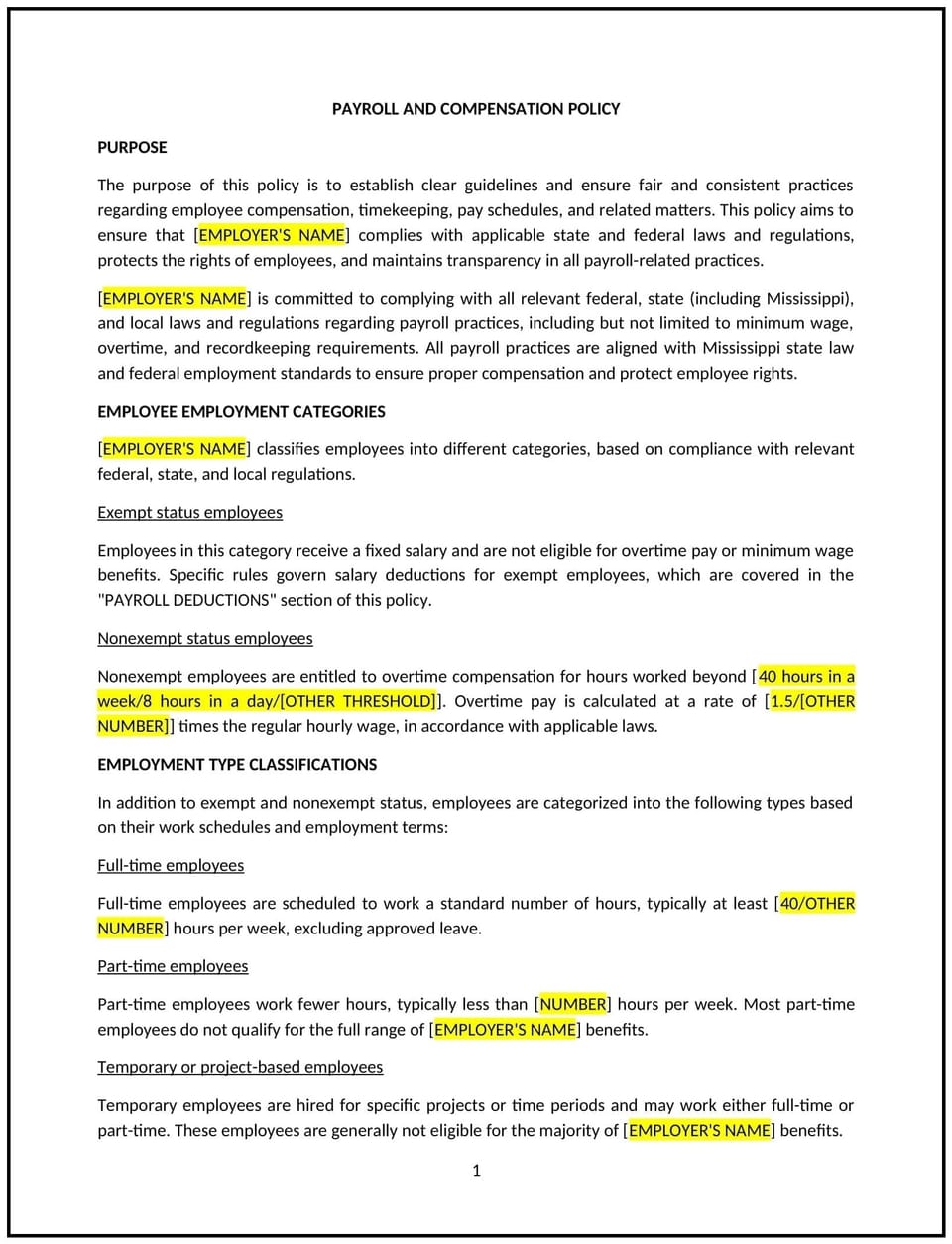Payroll and compensation policy (Mississippi): Free template

Payroll and compensation policy (Mississippi)
A payroll and compensation policy outlines the structure for employee wages, salary payments, and payroll administration in Mississippi businesses. This policy ensures employees are paid accurately and on time while establishing clear guidelines on salary adjustments, overtime, deductions, and pay schedules. It also helps businesses manage payroll efficiently and maintain transparency in compensation practices.
By implementing this policy, businesses can create a reliable payroll process that supports employee satisfaction and financial stability while reducing payroll-related disputes.
How to use this payroll and compensation policy (Mississippi)
- Define pay schedules: Outline the frequency of employee pay periods, such as weekly, biweekly, or monthly, and specify when employees can expect payment.
- Explain wage structures: Clarify how employees are classified as hourly, salaried, or commission-based, including pay calculation methods for each category.
- Outline overtime pay: Describe how overtime is calculated and paid according to state and federal laws, ensuring clarity for eligible employees.
- Address salary adjustments: Establish how raises, bonuses, and performance-based pay increases are determined and communicated.
- Detail payroll deductions: Specify mandatory deductions such as taxes, Social Security, and voluntary deductions like benefits contributions or retirement plans.
- Clarify direct deposit and payment methods: Provide details on how employees receive their wages, including options for direct deposit, paper checks, or payroll cards.
- Set reporting procedures for payroll discrepancies: Explain how employees can report errors in pay and the process for resolving discrepancies.
- Establish final paycheck guidelines: Define how final wages are paid when an employee leaves the company, including any deductions for outstanding debts.
- Review and update the policy regularly: Ensure payroll practices align with business needs and any regulatory updates.
Benefits of using this payroll and compensation policy (Mississippi)
This policy offers several benefits for Mississippi businesses:
- Provides payroll consistency: Helps businesses establish clear and predictable payroll schedules.
- Reduces payroll errors: Minimizes confusion over pay rates, overtime, and deductions, reducing disputes.
- Enhances transparency: Ensures employees understand how they are paid and what deductions apply to their wages.
- Improves employee satisfaction: A well-managed payroll process builds trust and confidence among employees.
- Supports financial planning: Helps businesses manage payroll expenses efficiently while maintaining compliance with payroll regulations.
Tips for using this payroll and compensation policy (Mississippi)
- Communicate the policy clearly: Ensure all employees understand their pay structure, payment methods, and how to report payroll concerns.
- Maintain accurate payroll records: Keep detailed records of wages, deductions, and hours worked to prevent disputes and ensure proper reporting.
- Train payroll administrators: Provide training to payroll staff on handling salary adjustments, tax withholdings, and compliance requirements.
- Monitor overtime and deductions: Regularly review payroll data to ensure that overtime and deductions are processed accurately.
- Review pay structures regularly: Evaluate salary scales and wage structures periodically to remain competitive in the market.
Q: Why should Mississippi businesses have a payroll and compensation policy?
A: A payroll and compensation policy ensures that employees are paid fairly and on time while helping businesses manage payroll efficiently and reduce errors.
Q: How often should employees be paid?
A: Businesses should define their pay schedule, whether weekly, biweekly, or monthly, and ensure employees are informed of payment dates.
Q: How should businesses handle payroll errors?
A: Employees should report payroll discrepancies to the payroll department or HR, and businesses should correct errors as soon as possible.
Q: Are employers required to offer direct deposit?
A: Direct deposit is a common payment method, but businesses should confirm with Mississippi regulations whether they can require employees to enroll in it.
Q: What should businesses include in final paycheck procedures?
A: Businesses should clarify how and when final wages are paid, including deductions for any outstanding debts owed by the departing employee.
Q: How should payroll records be maintained?
A: Businesses should keep detailed payroll records, including time logs, pay rates, and deductions, for compliance and auditing purposes.
Q: Can businesses adjust pay schedules?
A: Businesses can adjust pay schedules, but they should provide advance notice to employees and ensure compliance with applicable regulations.
Q: How often should this policy be reviewed?
A: Businesses should review their payroll and compensation policy annually to ensure it aligns with current wage laws and business needs.
This article contains general legal information and does not contain legal advice. Cobrief is not a law firm or a substitute for an attorney or law firm. The law is complex and changes often. For legal advice, please ask a lawyer.


